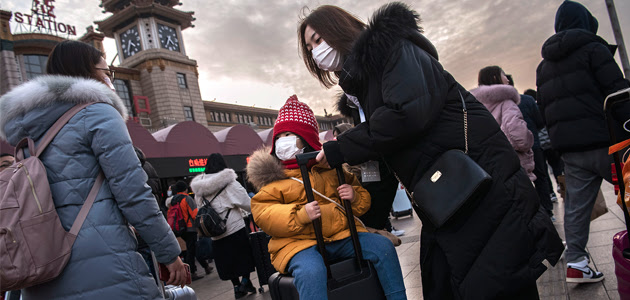
WHO Issues Advice on Coronavirus 2019-nCoV Which Has Killed 17 in China
As more than 500 people have been infected by a viral pneumonia caused by a new coronavirus (named by WHO as 2019-nCoV), and at least 17 people have died, WHO has issued travel advice and prevention advice for the public. The good news is that the World Health Organisation (WHO) convened an Emergency Committee which […]

As more than 500 people have been infected by a viral pneumonia caused by a new coronavirus (named by WHO as 2019-nCoV), and at least 17 people have died, WHO has issued travel advice and prevention advice for the public.

The good news is that the World Health Organisation (WHO) convened an Emergency Committee which advised that the event does not constitute a Public Health Emergency of International Concern… but they did agree on the urgency of the situation, and will reconvene in a few days’ time to reassess the situation.
What is Coronavirus 2019-nCoV?
It’s a new virus which comes from the same family as SARS and the common cold, say WHO. Because this is a coronavirus, it usually causes respiratory illness.
Where did this Coronavirus begin?
It was first reported in Wuhan City, China, on 31 December 2019, and has since been detected in travellers to other countries, including the USA. WHO is working with the Chinese authorities and global experts to learn more about the virus and how to prevent its spread.
What are the symptoms of Coronavirus?
Symptoms include fever and occasional difficulty in breathing. Chest radiographs have shown bilateral lung infiltrates.
Can Coronavirus be passed on from human to human?
Preliminary investigation suggests that there is no significant human-to-human transmission, and no infections among health care workers have occurred, says WHO.
However transmission potential and modes of transmission remain unclear and more information is required to better understand the mode of transmission and clinical manifestation of this new virus.
What is the source of this newly discovered Coronavirus?
The source of this new virus is not yet known, however virologists believe that snakes – the Chinese krait and the Chinese cobra – may be the original source of this coronavirus.
For now, the following advice has been issued in relation to the pneumonia outbreak caused by the new coronavirus in China:
WHO Advice for the Public
WHO’s standard recommendations for the general public to reduce exposure to and transmission of a range of illnesses are as follows, which include hand and respiratory hygiene, and safe food practices:
- Frequently clean hands by using alcohol-based hand rub or soap and water;
- When coughing and sneezing cover mouth and nose with flexed elbow or tissue – throw tissue away immediately and wash hands;
- Avoid close contact with anyone who has fever and cough;
- If you have fever, cough and difficulty breathing seek medical care early and share previous travel history with your health care provider;
- When visiting live markets in areas currently experiencing cases of novel coronavirus, avoid direct unprotected contact with live animals and surfaces in contact with animals;
- The consumption of raw or undercooked animal products should be avoided. Raw meat, milk or animal organs should be handled with care, to avoid cross-contamination with uncooked foods, as per good food safety practices.
WHO Advice for International Travel and Trade
International travellers: practice usual precautions
As transmission potential is still unclear, it would be prudent to reduce the general risk of acute respiratory infections while travelling in or from affected areas (currently Wuhan City) by:
- avoiding close contact with people suffering from acute respiratory infections;
- frequent hand-washing, especially after direct contact with ill people or their environment;
- avoiding close contact with live or dead farm or wild animals;
- travellers with symptoms of acute respiratory infection should practice cough etiquette (maintain distance, cover coughs and sneezes with disposable tissues or clothing, and wash hands).
No restrictions to international traffic have been recommended at this time.
All information sourced from WHO.
